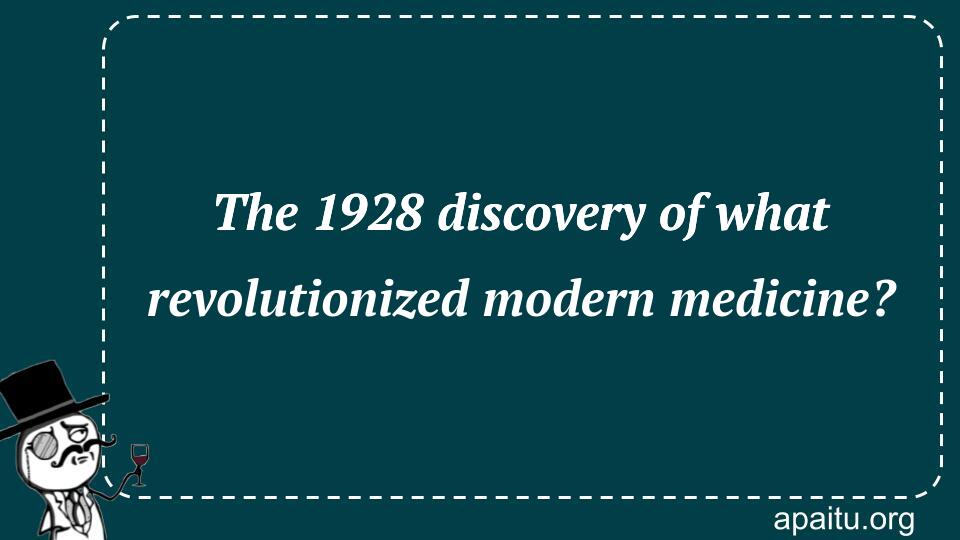Question
Here is the question : THE 1928 DISCOVERY OF WHAT REVOLUTIONIZED MODERN MEDICINE?
Option
Here is the option for the question :
- Radium
- X-rays
- Penicillin
- Germs
The Answer:
And, the answer for the the question is :
Explanation:
Dr. Alexander Fleming discovered penicillin, the first antibiotic, on a brisk October day in London, England, in 1928. After returning to a disorganized lab from vacation, he made the serendipitous discovery that the mold penicillium suppressed bacterial development in his specimens.

In 1928, Alexander Fleming made a discovery that revolutionized modern medicine: he discovered penicillin, the first antibiotic. This discovery had a profound impact on the field of medicine, saving countless lives and paving the way for the development of other life-saving drugs.
Fleming’s discovery of penicillin was the result of a chance observation. While studying staphylococci bacteria in his laboratory, he noticed that a mold had contaminated one of his petri dishes. He also noticed that the bacteria surrounding the mold had been destroyed. This led him to conclude that the mold was producing a substance that was toxic to the bacteria.
Fleming named this substance “penicillin” and began to study its properties. He found that it was effective against a wide range of bacteria, including those that caused pneumonia, meningitis, and other serious infections. However, he was unable to produce enough of the substance to conduct clinical trials.
It wasn’t until a decade later that penicillin was successfully mass-produced and used to treat bacterial infections. During World War II, penicillin was used to treat wounded soldiers, saving countless lives and helping to turn the tide of the war. After the war, penicillin became widely available to the general public, and it quickly became one of the most commonly prescribed drugs in the world.
The discovery of penicillin was a game-changer for modern medicine. Prior to the development of antibiotics, bacterial infections were often fatal, and there was little that doctors could do to treat them. Antibiotics like penicillin made it possible to treat these infections and save countless lives.
However, the overuse and misuse of antibiotics have led to the development of antibiotic-resistant bacteria, which are now a major public health concern. In recent years, there has been a renewed focus on developing new antibiotics and using existing antibiotics more judiciously to prevent the development of antibiotic-resistant bacteria.
the discovery of penicillin in 1928 revolutionized modern medicine, saving countless lives and paving the way for the development of other life-saving drugs. While the overuse and misuse of antibiotics have led to the development of antibiotic-resistant bacteria, the legacy of penicillin continues to be felt today, as researchers work to develop new antibiotics and improve the use of existing antibiotics to combat bacterial infections.